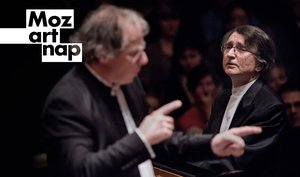Liszt Academy - Grand Hall
MOZART: Horn Concerto in D major, K. 412
MOZART: Deh, vieni, non tardar - Susanna’s aria from The Marriage of Figaro
MOZART: Concerto for Flute and Harp in C major, K. 299
--intermission--
MOZART: Ch’io mi scordi di te?, K. 505
MOZART: Piano Concerto in C minor, K. 491
Perfomed by Orsolya Kaczander flute, Lenka Petrovic harp, Andrea Rost soprano, Izabella Simon piano, Evgeni Koroliov piano, Bálint Tóth horn
Concerto Budapest
Conductor: András Keller

Three, and at the same time three types of concerto, plus two different kinds of aria feature in the closing concert of Mozart Day conducted by András Keller, which given its intense programme and quality performers could well serve as the perfect way of summing up the entire day. Of the three concertos, there is no doubt that the Piano Concerto in C minor with solo by Evgeni Koroliov enjoys the greatest renown and at the same time a cult status. It dates from that six months (from October 1785 to April 1786) considered to be the composer’s most fertile period of his career. Analysts generally characterize the basic mood of the Mozart piano concerto intended for his own academy of composers and performers in the Burgtheater with the adjectives ‘tragic’ and ‘upsetting’, indeed ‘demonical’ or indeed ‘sombre’. The rose aria from The Marriage of Figaro also represents this period although recalling a totally different atmosphere, which in the performance by Andrea Rost certainly creates the sense of love’s ability to uplift from the everyday. “Storazzi [=Nancy Storace], the beautiful singer, entranced my eyes, my ears, my soul. Mozart directed the orchestra, hammering his piano. Yet it is not permitted to speak of those non-physical pleasures such as those music gives. Where is the word that describes that?” This is how Ferenc Kazinczy recalled the first Susanna in opera history and the performance in Vienna of The Marriage of Figaro, and after the intermission our brilliant soprano prepares for another performance of a (concert)aria, “Ch'io mi scordi di te?”, which was specifically written for Storace in December 1786.
In addition, the closing concert has room for the Concerto for Flute and Harp in C major composed during a trip to Paris in 1778 for the Comte de Guines and his daughter, today with solos by Orsolya Kaczander and Lenka Petrovic. Similarly, the Horn Concerto in D major allows BálintTóth to shine. In the autograph score there is a humorous aside directed at Leutgeb, a good friend of Mozart, which undeservedly mocks, at length, the excellent horn player, referring to him as ‘Mr. Donkey’.
